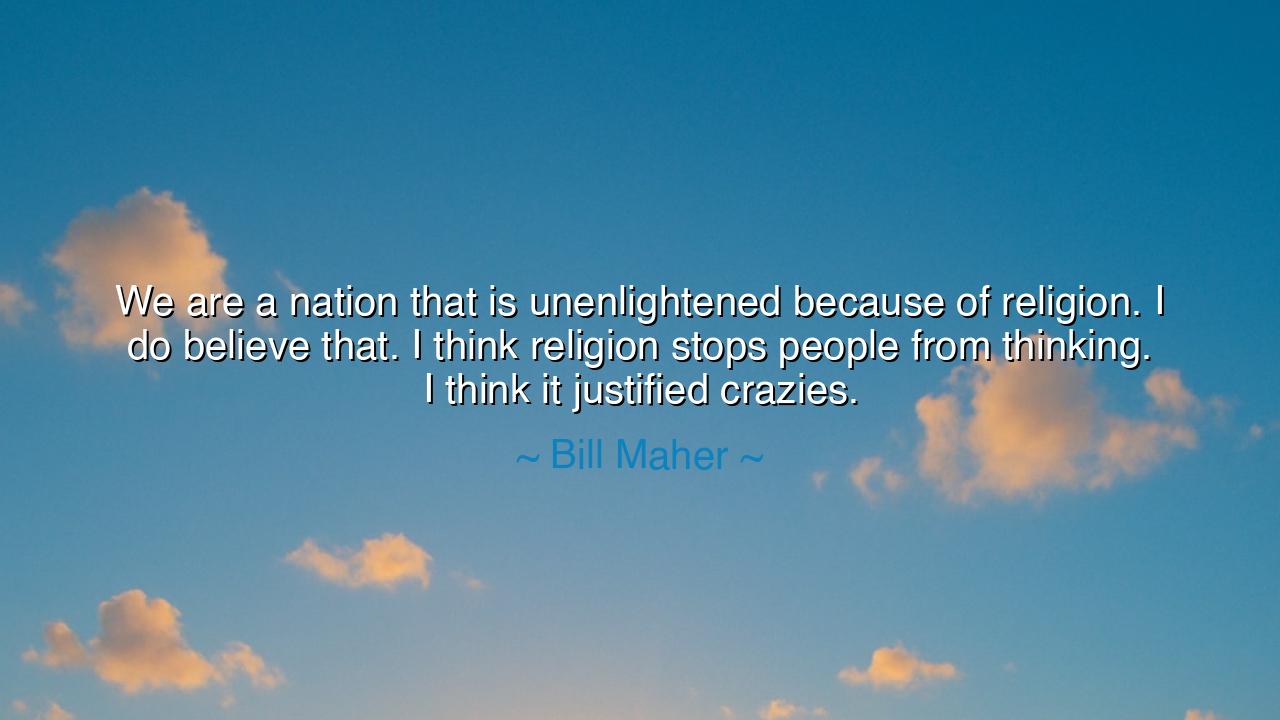
We are a nation that is unenlightened because of religion. I do
We are a nation that is unenlightened because of religion. I do believe that. I think religion stops people from thinking. I think it justified crazies.






Hear now the sharp and unflinching words of Bill Maher, who proclaimed: “We are a nation that is unenlightened because of religion. I do believe that. I think religion stops people from thinking. I think it justified crazies.” These words are not soft or comforting; they are words of fire, meant to awaken, to provoke, and to stir thought. They come not from the halls of faith but from the spirit of critique, challenging humanity to examine the shadows that sometimes grow beneath the sacred. Maher speaks as one who believes that when religion oversteps its bounds, it becomes not a lantern of wisdom but a chain upon the mind.
The origin of this saying lies in the long struggle between free inquiry and dogma, a struggle that has shaped the destiny of nations. In the Enlightenment, thinkers like Voltaire, Diderot, and d’Holbach raised their voices against the power of the church, which they believed suppressed truth and enslaved thought. Maher, speaking centuries later, inherits their spirit. His accusation is clear: when religion demands blind obedience, it can hinder progress, silence reason, and give shelter to fanaticism.
History provides many echoes of this tension. Recall the trial of Giordano Bruno, who dared to suggest that the universe was infinite, with worlds beyond our own. For such visions, he was condemned as a heretic and burned at the stake. The religion of his time saw his ideas as dangerous, yet today they are celebrated as courageous glimpses into the truth of the cosmos. Maher’s words, though sharp, remind us that when belief refuses questioning, it may transform into a weapon against enlightenment.
Yet let us not misunderstand him. His quarrel is not with the yearning for the divine, but with the ways in which religion has sometimes been used to justify extremes. In the Crusades, warriors marched under holy banners to slaughter in the name of God. In more recent times, acts of terror have been clothed in the garments of faith. To Maher, these are proofs that when faith is twisted, it can serve not as a balm but as a sword, not as light but as darkness.
Still, wisdom requires balance. For just as history bears witness to the misuse of religion, it also testifies to its power for good. Faith has inspired saints who tended to the poor, abolitionists who broke the chains of slavery, and countless souls who endured suffering with hope. The very Enlightenment that Maher praises was also carried forward by believers who reconciled reason with faith. Thus, the truth is not simple: religion can enslave, yes, but it can also liberate, depending on the heart of the one who wields it.
The lesson, O listener of tomorrow, is this: do not let belief silence your reason, nor let reason blind you to the power of belief. Question boldly, for questioning is the path of wisdom. Beware of any system—sacred or secular—that demands unthinking obedience, for such systems breed extremism. Maher warns us against the dangers of crazies justified by religion, but the deeper wisdom is to guard against any ideology that closes the mind and hardens the heart.
Therefore, take action. If you are a person of faith, let your faith be tempered by thought, humility, and compassion. If you are a skeptic, let your skepticism be guided not by mockery but by a search for truth. Seek always the balance where reason and reverence may walk together. In this way, you will not be among the unenlightened, but among those who carry both the fire of inquiry and the light of conscience into the future.






AAdministratorAdministrator
Welcome, honored guests. Please leave a comment, we will respond soon